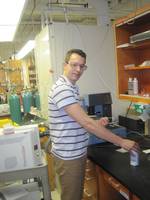Fabian Schax, from Prof. Christian Limberg's UniCat working group, is the first PhD student to participate in the exchange program with Northwestern University in Evanston. UniCat asked him about his impressions and experiences as an exchange scientist in the USA.
UniCat: Mr. Schax, you have now spent three months as part of Prof. Dr. Justin Notestein’s working group at The Department of Chemical and Biological Engineering. What impressions will you take back home with you?
Fabian Schax: Although I had already spent a year in the USA after high school, the structure of life, studies, and research at an American University was unknown to me. It was new and surprising to me to see the intense cooperation between my working group and industry on some projects with practical applications. The doctoral students are in regular contact with their industry partners, and can, thereby, establish contacts with potential future employers early on. Due to its good reputation, doctoral candidates from this University are already recruited by big firms before completion of their dissertations, and interviews are held directly on campus. This is a situation that we can currently only wish for in Germany!
UniCat: The Project you began at Northwestern University would likely be attributed to basic research...
Fabian Schax: As part of my previous research, I had synthesized some until-then unknown siloxides, that I wanted to immobilize on solid supports, in order to use them as a catalyst. As scientist who studies coordination chemistry, several of the technics and devices were unfamiliar and challenging to me at first. But through my helpful and understanding co-workers, I quickly gained a foothold in my project. For me personally, it was a valuable experience to see how quickly I could familiarize myself with a new subject area even if it had not previously been a focus of my studies and research. An experience that I am certain to repeat often in my career as a chemist!
UniCat: For your doctoral thesis you are seeking to develop siloxide based complexes that can be grafted on solid supports and later on may act as catalysts. What advantages for your dissertation do you gain from your research period abroad?
Fabian Schax: Through the knowledge, insights and experiences that I have gained here in Evanston in the field of surface chemistry, it is possible for me to better understand the research results of the system that inspired me. The Northwestern University has excellent equipment using the latest technology for the characterization of materials, which I needed for my cooperation project. Furthermore, it was made possible for me to spend two days conducting experiments with synchrotron radiation at a nearby national research institute. Executing my project at my home university would certainly not have been possible to this extent.
UniCat: How was the personal aspect of life in Evanston?
Fabian Schax: My co-workers and supervising Professor welcomed me very warmly and were extremely helpful in making me feel comfortable in Evanston. I came to Evanston without knowing a single person, but I have developed friendships with my colleagues that go beyond the contact in the laboratory. I hope that a counter exchange will take place in the near future so that I can give back in Berlin, some of the hospitality and helpfulness that I experienced.
UniCat: What tips would you give other UniCat exchange doctoral students?
Fabian Schax: If you ever get the chance to work in a different working group, you should take advantage of the opportunity immediately! Chemistry is really such a broad field, and it is exciting to see how other working groups conduct their research. Often we have the same goals, but the path is extremely different! Over the course of the several years of study towards a PhD, one tends to see only one’s own project and inevitably to specialize in one subject area. By participating in an exchange you can often easily break out of this unintentional situation.
UniCat: Was the cooperation project a dive into the deep end for you, one which one should fear?
Fabian Schax: No, not at all. The expression, „learning by doing“ certainly describes best how I deepened my scientific abilities at the Northwestern University. It is important that you approach your co-workers openly, and aren’t afraid of questions. At the beginning I needed every instrument explained to me, and I felt more like an undergrad than a PhD candidate. But I was able to learn much more and much more quickly from my co-workers than I could have through self-study. The good thing is, that you also bring knowledge and ability to the table that your co-workers can profit from. I was able to help my colleagues with organic and inorganic synthetic chemistry, and it has left a lasting impression to see both parties advance more quickly through an exchange of experiences. After the NSA scandal, the reputation of the USA has certainly suffered in Germany. Therefore, it is even more important that young people go to the USA, to form their own opinion of “the Americans”. I think that you will be pleasantly surprised.
UniCat: Does Evanston have more to offer than just science?
Fabian Schax: Evanston as a University town with its proximity to Chicago is very attractive. Lake Michigan is directly behind the campus, and after a day in the lab you can jump right into the lake and cool off!
UniCat: Mr. Schax, thank you very much for the interview. We wish you all the best for your return to Germany and for your dissertation project.
The interview was conducted by Martin Penno.
Photos: Christian Kuhn / TU Berlin


